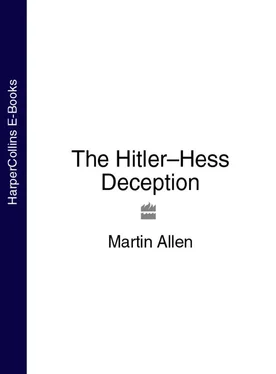On returning to Bavaria at the end of November 1918, Hess found his country facing a peril he had only read about in newspapers – the threat of a Bolshevik revolution similar to that which had taken place in Russia a year before. A militant Bolshevik organisation called the Spartakusbund had taken over Bavaria, overthrown the legitimate Bavarian government, and set up its own Soviet Republic of Bavaria, the Räterepublik.
With the end of war, Germany had been plunged into political turmoil. On one side was the far left, predominantly led by militant workers and educated men well-versed in the works of Marx; on the other was the right wing, made up virtually without exception of the middle classes and war veterans determined that these Bolshevik troublemakers should be crushed completely before Germany descended into chaos. The country teetered on the very edge of an abyss that had the potential to mirror what was taking place in Russia.
Intent on taking his part in the struggle, Rudolf Hess quickly joined a right-wing band of veterans called the Thule Gesellschaft – the Thule Society – set up to counter the organised thuggery of the Spartakusbund. Over the course of the next five months, much bitter street-fighting ensued in the struggle to prevent the Spartakists consolidating their grip on power in Bavaria. The Thule Gesellschaft may be considered a forerunner of the Nazi Party, created before National Socialism became a concept; indeed, created even before Adolf Hitler became prominent. It was a nationalist anti-Bolshevik society, used the swastika as its emblem, and loudly proclaimed the motto ‘Remember you are German. Keep your blood pure.’ It was not as large an organisation as the Spartakists, and its struggle was hard, but events were about to turn in its favour.
In late April 1919, the Spartakists captured seven Thule Society members and an innocent bystander called Professor Berger, a Jewish academic who had the incredible bad luck to be swept up as a member of the anti-Semitic society. His luck was about to get worse, as all eight men were summarily executed. The Spartakists then made the fatal error of accepting three Bolshevik emissaries sent from Moscow by Lenin. These three Russian agitators promptly took over the Spartakusbund, and began to consolidate their power-base in Bavaria’s new Räterepublik by instigating a Soviet-style purge.
This was all too much for the new German government. From Weimar in Thuringia they watched events in Bavaria and blanched, for the Spartakusbund had nailed its colours to the mast by declaring that its ultimate aim was to topple the legitimate government and set up a Soviet Germany. Prompted by a sense of self-preservation, the government sent troops in to restore order, gladly accepting help from the Freikorp Epp (a right-wing paramilitary organisation affiliated to the Thule Society), and succeeded in toppling the Spartakists. With the collapse of the Räterepublik most people in southern Germany breathed an enormous sigh of relief, and hoped that the natural order of predominantly conservative Bavaria would re-assert itself, and that they could now get on with their lives.
It was at this time, mid-1919, that Rudolf Hess first made the acquaintance of Professor General Karl Haushofer, the man who would instil in him the political awareness and the understanding of world affairs that he would apply to his as-yet unplanned career in politics. Twenty-five years later, in October 1944, an investigation by the FBI would take a statement that revealed: ‘According to [Name Censored] Rudolf Hess … brought Hitler and Haushofer together [and this] combination of Hess and Haushofer was, in the opinion of [Censored] the root of the Nazi Party.’ 2But this statement missed the crucial fact that Karl Haushofer and his son Albrecht became confidential advisers to Adolf Hitler and Rudolf Hess on their most important foreign policy matters – in effect an unofficial Führer’s private office on foreign affairs.
On a balmy summer’s evening in 1919 a man called Beck invited his friend and fellow member of Thule Gesellschaft Rudolf Hess to dine with him at the home of Professor Karl Haushofer, ‘an old-time pan-Germanist’ 3who had commanded the Thirteenth Bavarian Infantry Division during the First World War. This first meeting between Haushofer and Hess, a purely social affair, was an immediate success. Long into the night, an enthralled Hess sat and listened intently to everything the eminent Professor had to say about the wrongs of the Treaty of Versailles, and his views on foreign affairs defined under the all-encompassing banner of Welt-Politik (world politics), as determined by his new theories of ‘geopolitics’. For Hess it was the opening of an intellectual door, and he suddenly came to believe that there was a bigger picture to consider – that of the new age to come – which through science would redefine the world. Haushofer had himself undergone this intellectual revolution in the late 1890s.
Basically, geopolitics was the theory, as promulgated by Haushofer, that in the future the world would be restructured into an age of great land-empires, dominated by ‘the Heartland’, an area ‘invulnerable to sea-power in Central Europe and Asia’. 4This, Haushofer asserted, would revolutionise the world’s balance of power, ushering in a ‘new age’ of stability, peace and prosperity for all.
In 1904, the eminent British geographer H.J. Mackinder had written a paper titled ‘The Geographical Pivot of History’, 5which Haushofer had read avidly, particularly the paragraph that declared: ‘The spaces within the Russian Empire and Mongolia are so vast, and their potentialities in population, wheat, cotton, fuel and metals so incalculably great, that it is inevitable that a vast economic world, more or less apart, will there develop inaccessible to oceanic commerce.’ Mackinder went on to expound his theory that
sea power alone, it if is not based on great industry, and has a great industry behind it, is too weak for offence to really maintain itself in the world struggle … both the sea and the railway are going in the future … to be supplemented by the air as a means of locomotion, and when we come to that … the successful powers will be those who have the greatest industrial base . .. [and] those people who have the greatest industrial base … [will] have the . . . power of invention and science to defeat all others. 6[Author’s italics]
Hess listened to all this and more, as Haushofer explained his theory that ethnicity should be added to this geopolitical formula. All Europe’s current borders, he maintained, resulted from old-world wars and conflict dating back to the Dark Ages, the time of strife and confusion following the collapse of Rome. European peace would only truly come about when Europe was redefined according to ethnic background. And that meant, by happy coincidence, that Germany and the Germanic peoples would become the largest single bloc, dominating central Europe.
Hess quickly became a total convert to Haushofer’s theories, and for his part the elderly Professor took a keen interest in the intriguing young man, who showed signs of considerable ability. A ready friendship soon developed between the two, Hess finding the genteel Haushofer a stark contrast to the authoritarian figure his own father had been. ‘He is a wonderful man,’ 7wrote Hess, and within a few days of their first meeting the two would meet after Hess finished work to stroll in the park, often on their way to dinner at Haushofer’s home. Here Hess found himself readily absorbed into the Haushofer family, developing a close affection for Haushofer’s ‘very nice’ half-Jewish wife, Martha, and becoming firm friends with the Professor’s sons, Albrecht and Heinz.
Hess got on particularly well with Haushofer’s elder son, Albrecht, an intelligent young man of seventeen. A friendship swiftly developed that would last the rest of their lives. In a foretaste of events to come, Hess would comment: ‘I sometimes go for a walk with [Albrecht], and we speak English together.’ 8At the time, however, Hess could have had no concept of how entwined his and Albrecht’s lives would become.
Читать дальше












